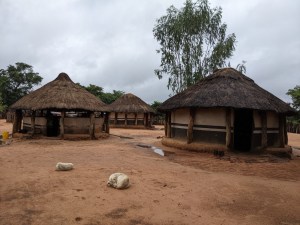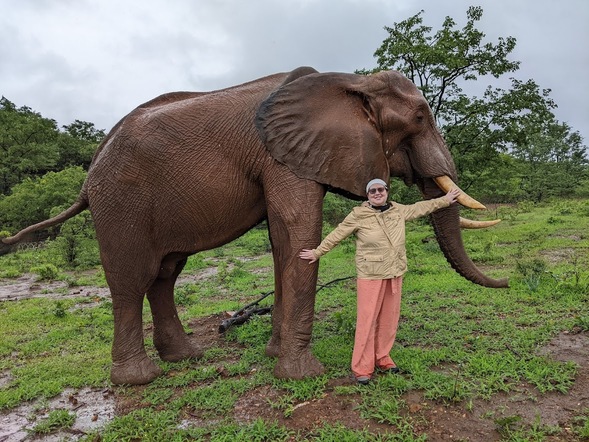The first visit we made today was to a nearby Zimbabwean village. But it began with a stop at the supermarket in town.

Some village tours in this area compensate their hosts by way of a monetary payment to the village chief. That isn’t how Old Drift does it. Instead, they first help you buy the kind of gifts any family in the village is likely to need. Then they find a family who’s at home and has the time and willingness to host a visitor — it sometimes takes a few tries, though we were welcomed on the first attempt. The guest presents their gifts to the family directly, at the end of their visit.
So we loaded up a shopping cart with cooking oil and sugar and salt; long blocks of green, all-purpose soap and big bags of cornmeal. A loaf of bread for a family treat. Cookies and candy for the children. Wrangled it all into the van and set out for the nearest village.
The nearest village is about ten kilometers away. Villagers who work in town will often walk it, both ways, every day. The few children from the village who attend high school can’t do it and still get to school on time — they’d have to begin in the dark, and it’s much too dangerous to walk that road in the dark. There are predators on that road during the night, and I don’t mean the human kind. Human teenagers are about the size of an impala, and they make just as good a meal for a lion or a hyena. So those who go to high school at all — few can; it’s terribly expensive for village families, though they are as concerned as any parent about the need to further their children’s education — either hitch a ride with the few locals who have vehicles, or else live in town with relatives during the school year.
We stopped several times on the way into the village to greet young men and boys who were herding their animals out to pasture. Cattle, goats, a few donkeys. I was introduced, said a few words, offered them a handful of our candy, and we moved along to pay a call at the Nuwe compound. Mr. Nuwe’s name means baboon, and he explained to me later that this meant he was considered kin to baboons, and could never kill or eat them. Other people, with different names, could and did.
Respect is important in the village. When Musa pulled up to the Nuwe family compound, he made sure we were standing well outside the invisible line that marks the entrance to the property, and then asked Mr. Nuwe if we might be allowed to enter his domain. Mr. Nuwe answered with ritual words of welcome, and shepherded us across the threshold.

A Zimbabwean village home is not one building; it’s several — small, one-room round houses with thatched roofs, with a big open yard at the center. It’s usually situated between its corn fields. Mr. Nuwe showed me into the Winter Kitchen — a gathering house in which the family cooks and eats, and hangs out together after dinner, during the cooler months — and introduced me to his wife, who was holding a baby and a three or four year old. She sat on the floor on a reed mat, and Mr. Nuwe offered me a stool, though he explained that in their culture, women usually sat on mats on the floor. (There’s certainly an element of sexism involved here and he knew it, though some of it’s also practical — you can’t gather up several small children in your lap if you’re on a stool.) I often sit cross-legged on the floor at home, so I asked him instead if I could have a mat and join them in the traditional way. This seemed to please all of them very much, though he wasn’t quite sure if I was going to be able to stick it out till we were ready to move to a different building. I did. I’m comfortable on the floor.
Mr. Nuwe explained a lot about their culture — how they make medicines out of the nearby bush plants; how they pray to their ancestors in times of trouble, and give them presents of snuff and beer; how they pay a bride’s father for permission to marry. The latter isn’t a traditional dowry arrangement… for one thing, there’s no fixed amount to it. For another, there’s no arranged marriages. A man and woman agree between themselves that they want to marry, and then the groom just keeps paying out livestock to his lady’s father until the father eventually relents and permits the marriage. I suspect it’s a very effective way to test how serious the young man is about your daughter — nobody hands over scarce resources with no concrete end in sight unless they’re pretty determined to win the prize. But women have considerable clout behind the scenes here, and a woman who wants to marry can eventually persuade her father to call a halt to the installment payments and let her go to her young man.

While I listened to Mr. Nuwe and asked occasional questions, I was also playing with the baby in Mrs. Nuwe’s lap beside me. Mrs. Nuwe asked if I would like to hold her. I accepted gladly, and enjoyed my first chance to cuddle a baby in several years. I think it was the highlight of the visit for me. The baby, three months old, was not the Nuwes’ child — she actually belonged to a young woman in the extended family, who looked about fifteen. I never did get the nerve to ask her age, or how she was related. But large, extended families normally live together in traditional Zimbabwe — the Nuwes’ household consisted of fourteen people, including Mr. and Mrs. Nuwe, their children (or possibly child; the toddler was introduced to me as their oldest, so I’m not sure whether any of the other kids on the premises were theirs), Mrs. Nuwe’s sister and her family, and several cousins.

After a long discourse on the culture and lifestyle of the villagers, Mr. Nuwe took me around the rest of the compound. There was a summer kitchen, with much better ventilation than the winter one, and several houses which served as bedrooms for different clusters of relatives. Outdoors, there was a washing station, and equipment for crushing dried corn into cornmeal, which they let me try. Several dogs lay around the yard, indolent in the daytime. Their job is to wake the household at night if wild animals intrude. Free-roaming chickens and guinea fowl (a native bird often kept for egg production) poked at the ground for insects.
When we were ready to leave, it was time to present my gifts. We went to the car and I handed out the goodies: to the women, bags of cornmeal and other supplies; to the children, handfuls of cookies and candy. They accepted in the traditional way, in both hands, cupped as if receiving a treasure, and with a slight bending of the knee. It made me feel like a noble distributing largesse… a feeling I was not entirely comfortable with, but there’s also something pretty special about accepting a gift reverentially, and showing that it’s important to you, and I found myself wishing we were more conscious about that kind of thing at home. We said our goodbyes, exchanging contact information “so that we will not forget you and you will not forget us.”
I won’t.
From the village, we went to the elephant sanctuary, where I met one of their herds. The sanctuary began in response to a horrifically mismanaged government culling of the wild elephant population, which cut across herds and left dozens of orphaned baby elephants. Individual rich people took them in as pets… and found that a traumatized elephant who has bonded with you is no picnic to manage. If you go away for a week, it wrecks your property searching for you — it thinks it’s lost its herd again. A determined elephant is too big to stop with, well, pretty much anything available to the private citizen. The government can’t even keep them from destroying the baobabs when food is scarce, and baobabs are among the biggest and strongest trees in the world. The individuals who had taken them in were clearly out of their depth.
So it was generally conceded that Zimbabwe needed a better place to care for the orphans, and Wild Horizons, the organization which runs most of the major tourist projects in Victoria Falls (including Old Drift Lodge) stepped in. They created a semi-secure environment in which the elephants are let out by day “to be elephants,” while coming in at night to be protected from the predators they never had a chance to learn, as calves, how to manage. (A normal adult elephant is nearly immune to predators, but these were not normal elephants.) Rangers tracked the herd’s progress, applied veterinary care when needed, and fed them when times were lean, since they had never had the chance to learn from their mothers and grandmothers how to find food under harsh conditions.
Slowly, they began introducing them to people — originally schoolchildren, because they hoped that teaching a younger generation about elephants and their complex social life might help prevent a similar debacle on the part of future governments. Tourists like me were added later, to help pay for the elephants’ upkeep.
The sanctuary currently harbors seventeen elephants — some of them veterans of the original culling, others orphaned by poachers, and a couple born to their females when a wild male paid them a visit. They’re arranged in three herds, selected by the elephants themselves, who choose on their own whom they want to socialize with. I was introduced to a herd of five — a pair of matronly females named Janet and Emily, who were inseparable best friends; two younger females including one of Janet’s offspring, and a big old bull named Jock, who was one of the orphans from the original culling project.

Jock was chosen as my primary contact. He was a steady old fellow, prone to resting his trunk on his one complete tusk when bored. He’d broken off the other several months ago, and it had already grown about halfway back. I was invited to touch his tusk, his trunk and the rough, thick skin on his elbow. Elephants sleep on the ground, on their knees and elbows, and a big male like Jock can weigh between ten and twelve thousand pounds. Clearly some pretty strong support is called for in those elbows and knees.
Everybody knows that elephants are big; they’re the biggest land animal now living. But you don’t realize — or at least I didn’t realize, until I stood right next to one — just how truly ridiculously big they are. No normal standard of comparison applies. I’m used to thinking in terms of a moose as really big when compared to a deer, or a Kodiak as really big when compared to a brown bear. But the African elephant is just in a class by itself. Twice my height and the length of a medium truck, Jock loomed over me like a sentient, breathing cliff.
He was, however, as enormously patient as he was just plain enormous. Clearly he does this regularly as part of the job, and he politely permitted me to touch him, pet his trunk, and feel the stiff hairs on it that help him use it not only as a prehensile tool, but as a primary sensory organ. I was then handed a couple of baskets of elephant treats, and all five elephants lined up in front of me, as I was shown how to feed them.

There are basically three ways to give the sanctuary elephants a treat. You can instruct the elephant “trunk up!” in which case he will lift his trunk high and open his mouth so you can toss the handful of treats in like a basketball. (Underhand tosses do not make it into a mouth that high.) Or you can hold them in your cupped hands while the elephant uses her trunk to suck up the treat like a vacuum cleaner and put it into her own mouth from the trunk. Or you can tell the elephant “trunk down!” and she turns her trunk upside down with the tip posed like a cup, so you can set the treats down on it and let her pop them into her mouth. I tried all three ways, with different elephants, instructed by the staff about which method each elephant preferred. I was impressed by how much the staff knew about the individual personalities of their specific elephants… you could tell they loved them and lived closely with them, even though they also really tried to leave them free to live as wild as they had the capacity to do, most of the time.
After I fed the elephants all the treats in the baskets, they were allowed to wander on their own… which meant that they immediately came over to hoover up all the bits of treat which had fallen. Then a couple of habituated warthogs — also orphans taken in by the sanctuary — trotted over to pick up the bits too small for the elephants to bother with. A small troupe of vervet monkeys bounced in too, grabbing whatever they could lay hands on before either the elephants or the warthogs could get it. They didn’t belong to the sanctuary; they were just vervet monkeys, meaning they’re bold as brass. The elephants looked at them with resigned disgust. I’m sure they’ve dealt with thieving vervets before. Everybody around here has.
Next post: the Lookout Cafe, with the world’s best view; and a magical game drive.


Leave a Reply